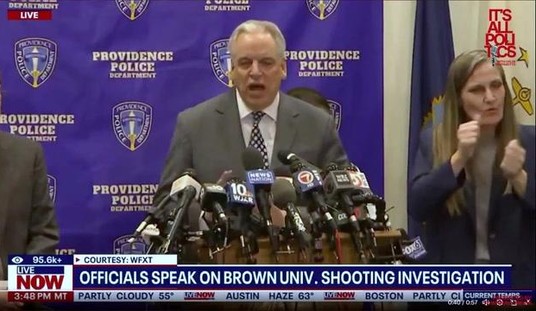Late last month on CBS's "Face the Nation," JD Vance angrily responded to criticism from the U.S. Conference of Catholic Bishops who called the deportation program by Donald Trump "deeply troubling."
Vance responded by bringing up the millions of dollars in contracts the Catholic Church has garnered to serve illegals over the last four years.
“I think that the U.S. Conference of Catholic Bishops needs to actually look in the mirror a little bit and recognize that when they receive over $100 million to help resettle illegal immigrants, are they worried about humanitarian concerns?" he asked. "Or are they actually worried about their bottom line?”
I have no doubt that there was concern for the plight of helpless people. But the Catholic Church received millions of dollars for other purposes as well, including bankrolling efforts to bring illegals into the United States, running shelters in cities to house illegals, and supplying other services to illegals such as legal aid.
"Over the past 50 years or so, however, Catholic Church-affiliated organizations, especially Catholic Charities, have become government contractors with a stake in a growing welfare state," writes Steve Malanga in City Journal.
The rise in spending on illegal aliens says a lot about why Catholic Churches want a slice of the goodies.
The Biden administration used radical changes in immigration policies, especially through its so-called parole program, to justify a vast expansion of federal spending on migrant services. Under Biden’s plan, those seeking entry into America received dates to appear in immigration court, often months in the future, and then were released into the country, usually without any means to support themselves. To service the swelling numbers of unsettled immigrants, including a sharp uptick in those applying for refugee status, the Biden administration and Congress dramatically expanded spending on immigration services. Funding for refugees and other “entrants” soared fourfold annually, from $2.2 billion in 2021 to $8.9 billion in 2022 and then to $10 billion in 2023. The biggest increases were in annual funding for unaccompanied minors, from $1.7 billion to $5.5 billion—suggesting the magnitude of the problem that Biden’s open-borders policy facilitated. Medical services for refugees and others grew fourfold, from $225 million to $1 billion. Large chunks of this money made its way to nonprofits as discretionary grants from the federal Office of Refugee Resettlement, which rose from $33 million in 2021 to $400 million in 2022 and then $616 million in 2023, according to Open the Books.
The Catholic Church was one of the leading recipients of this money. Contributions made to the U.S. Conference of Catholic Bishops and other Catholic charities for refugee assistance "rose from $14.6 million under the first Trump administration in 2019 to $122.6 million in 2022, according to audited financial statements. In just three years under Biden, those grants totaled more than $200 million," according to City Journal.
One signature federal program, Preferred Communities, tries to integrate immigrants into local communities. In 2023, the U.S. Conference of Catholic Bishops was the top recipient of these grants, garnering $66.5 million, reports Open the Books. Over three years, Catholic groups received some $110 million from this program alone.
This federal money, often heavily supplemented by local government contracts, has led to a startling growth in groups like Catholic Charities across the country in just four years. The ProPublica database of the financial filings of nonprofits lists 234 Catholic Charities entities around the U.S. The top 25 had revenues of slightly more than $2 billion in 2023, the last year filings are available for all groups. That’s an almost 50 percent increase, a gain of about $660 million, in four years. Some of these groups have been utterly transformed. Catholic Charities Fort Worth has become one of the nation’s largest local Catholic groups, with revenues of $289 million in 2023, compared with just $32 million in 2020.
The Catholic bishops will claim they're just doing God's work. That may be true, but the Catholic clergy are playing an active political role in a great national debate over immigration. The pontiff, Pope Francis, no doubt approves of the American Church's activism. But many Catholics do not.
It didn't help when a video emerged of a representative of Catholic Charities in Milwaukee coaching illegals on how to avoid arrest during a workplace raid.
It's actions like these that have rank-and-file Catholics angry about Catholic Charities.
As Vance’s remarks suggest, the Church’s role in helping to carry out the undeniably controversial immigration resettlement policies of the Biden administration is potentially divisive within Catholicism itself, because it appears to be at odds with what the American Catholic congregation broadly supports. Within the pews, there’s growing discontent, reflected in Vance’s criticism, of what some regular churchgoers call “professional Catholics”—that is, the administrative class that organizes and carries out the social-welfare mission of groups like Catholic Charities and lobbies for liberal social policies to support their work. Polls suggest they are out of sync with everyday Catholics.
A Pew survey last year showed that 55 percent of those who identified as Catholic supported Trump. Even Hispanic Catholics were almost evenly divided in their support of the candidates. Catholics who said they attended church regularly were even more supportive of Trump. Those results were part of broad backing among religious voters for Trump. By contrast, about seven in ten voters claiming no religious affiliation or belief said they supported Biden.
Tennessee Sen. Bill Hagerty is introducing the "Fixing Exemptions for Networks Choosing to Enable Illegal Migration Act," which would strip the tax-exempt status of organizations that assist illegal aliens.
“Tax-exempt status is a privilege, not a right, and these organizations will be able to preserve their tax-exempt status simply by ceasing these activities," says Hagerty. The government is not likely to pull the tax-exempt status for the Catholic Church or Catholic Charities, but it's certainly one way to put non-profit groups on notice that there are limits to using taxpayer money to "do God's work."










